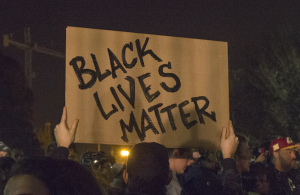
MPD faces criticism for subpar relations with minority communities. City activists cited D.C. Ferguson protests, pictured.
The Metropolitan Police Department received criticism from city activists for maintaining poor relationships with black and LGBTQ communities in Washington, D.C., during its annual public oversight hearing March 8.
The hearing, held in front of the D.C. Council’s Committee on the Judiciary, included extensive testimony from MPD Chief of Police Cathy Lanier, who noted a 9 percent drop in violent crime around the city and a steady rate of homicide over the past two years. There were 105 homicides in 2014 and 104 in 2013.
Representatives from the D.C. Ferguson campaign, a grassroots movement formed by members of the National Black United Front and the Act Now to Stop War and End Racism Coalition, among other organizations, also spoke at the hearing, decrying the alleged use of “jump outs” by the MPD.
A “jump out” occurs when a group of officers in an unmarked van quickly arrive at a public place and arrest anyone present suspected of criminal activity. Opponents criticized these operations, saying they were highly offensive and disproportionately affecting black communities.
D.C. Councilmember David Grosso (I-At Large) published a statement on Feb. 20, prior to the hearing, that condemned the MPD’s continued usage of jump outs, calling them unfair to city residents.
“[Police] come screaming up in a car, usually unmarked, and everybody piles out really fast and puts everyone against the wall to try to shake them down,” Grosso said to The Hoya. “There are many things wrong with that.”
Grosso explained that these tactics are ineffective at apprehending real criminals, as they now know to expect a “jump out” and are prepared to avoid arrest. Instead, he said they only increase tensions between police and the public, targeting black residents unduly and primarily taking place east of 16th Street NW.
“You have disrespect. You have a bad assumption that somebody is a criminal. You have a bad relationship,” Grosso said to The Hoya. “It just seems to me like it is a bad approach to policing.”
MPD spokeswoman Gwendolyn Crump acknowledged that while the MPD uses officers in plain clothes to investigate crime, there are no specific units that utilize this program to harass city residents.
“As Chief Lanier testified to the council in October, the department does not have ‘jump out’ units,” Crump wrote in an email to The Hoya. “Plain clothes and undercover police operations are used by MPD for multiple purposes such as investigating robberies, burglaries, drug, prostitution offenses, and gun offenses.”
Additionally, Crump strongly disputed the notion that the officers participating in these operations targeted specific black communities. Rather, she said they are solely conducted to reduce crime.
“They are not targeted at any particular community,” Crump wrote. “[They] are used to address crime problems and citizen complaints.”
However, Grosso disputed Crump’s claims that targeted jump outs do not occur, citing examples from his time as councilmember as evidence and adding that parents teach their children on ways to react if a situation like this occurs.
“Maybe they want to protect their image and they don’t really want to talk about the reality of what’s happening on the street,” Grosso said. “There is really a use of this practice in D.C. so why they would deny it is baffling to me.”
Eugene Puryear of the D.C. Ferguson Movement echoed Grosso while testifying at the oversight hearing, calling MPD’s refusal of acknowledging their use of the tactic as a major part of the organization’s dissatisfaction with police and “the reason why we have to stand up and say ‘Black lives matter,’” according to The Washington Post.
Grosso said that the first step to stopping jump outs would be for Lanier to admit that they exist. For Grosso, passing a law to prohibit jump outs would not have the desired effect that a cultural change in the police force would.
“I think the most effective way to do this is for the chief to finally admit this and have the institutional training that steers this tactic out of their practice,” Grosso said. “The hardest part is getting the chief and others to admit that this is happening and having a negative effect on the city.”
Coinciding with the concerns about MPD’s relationship with black communities was criticism of its interaction with LGBTQ persons, according to a report released March 9 by the Hate Crimes Assessment Task Force. The report questioned the effectiveness of the MPD’s Gay and Lesbian Liaison Unit, hate crime data collection and interactions with D.C.’s trans communities.
The D.C. Trans Coalition released a statement specifically regarding the HCATF findings related to hate crime, which still regularly go unreported.
“We continue to receive reports of officers refusing to mark reports as possible hate crimes,” the statement said. “[W]e need to see greater respect given toward those reporting hate violence to ensure that these cases are properly reported.”
However, the report also noted that there were areas that the MPD was addressing in a timely manner, commending the timely progress of LGBTQ cultural competency training for MPD officers.
“MPD has committed to training all its personnel on LGBTQ cultural competency in calendar year 2015,” the D.C. Trans Coalition statement said. “[We] appreciate the opportunity to work together to create a quality product for officers and sergeants.”
In September, a Georgetown University student was injured in a bias-related assault involving sexual orientation, where MPD arrived first to the scene and took the student to a hospital.
GU Pride Media Manager and Historian Campbell James (SFS ’17) said that a relationship between police and the LGBTQ community is to everyone’s benefit.
“Having healthier relations between the general LGBTQ community and MPD is important,” James said. “If people who identify as LGBTQ cannot feel safe with the protection of MPD then that lack of trust permeates into distrust of other institutions.”




















